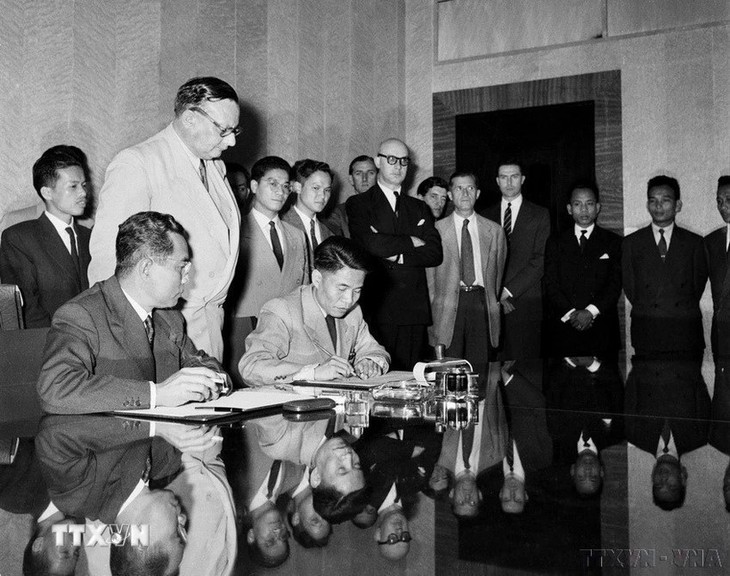(VOVWORLD) - The 1954 Geneva Agreement on Cessation of Hostilities in Vietnam was an important historical milestone in the cause of national liberation and reunification, said Minister of Foreign Affairs Bui Thanh Son.
 Deputy Minister of National Defense Ta Quang Buu (sitting, right) of the delegation of the Democratic Republic of Vietnam, and French General Henri Delteil, Acting Commander-in-chief of the French Union forces in Indochina, sign the agreement on the cessation of hostilities in Vietnam. (File photo: VNA) Deputy Minister of National Defense Ta Quang Buu (sitting, right) of the delegation of the Democratic Republic of Vietnam, and French General Henri Delteil, Acting Commander-in-chief of the French Union forces in Indochina, sign the agreement on the cessation of hostilities in Vietnam. (File photo: VNA) |
Son said the agreement hailed the values of national peace, independence, unity, and democracy.
He said, "For the first time in Vietnam's history, fundamental national rights which include independence, sovereignty, unity, and territorial integrity were recognized in an international treaty and recognized and respected by countries participating the Geneva Conference."
This achievement resulted from the Vietnamese people's persistent struggle, led by the Party, during the long resistance against colonialism, culminating in the globe-shaking Dien Bien Phu victory, he added.
The signing of the Geneva Agreement on Indochina 70 years ago demonstrates an important progress in the United Nations (UN) globalization process, according to David Fernandez Puyana, Ambassador, Permanent Observer of UN University for Peace (UPEACE) to the UN and other international organizations in Geneva.
He said this is a great success of many countries, with a series of Asian-African colonialized countries gaining independence in the late 1950s and early 1960s.
French scholar Eric Coudray, who did a thesis on French soldiers in the Indochina War, said the agreement contributed to ending the nine-year-long war, compelling nations to recognize the Democratic Republic of Vietnam (now the Socialist Republic of Vietnam) which they had previously denied.